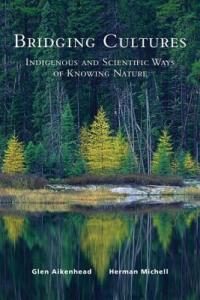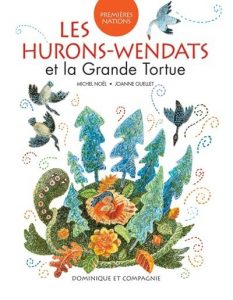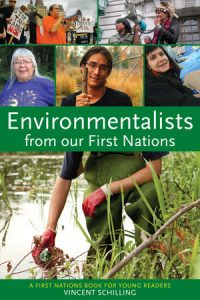Land-based education is about learning from, learning about, and learning for the betterment of the Land on which Indigenous peoples have lived since time immemorial. Indigenous communities across Turtle Island have always had a significant relationship with the environment, and this month’s Indigenous display highlights the diverse ways in which this relationship can be explored—both inside and outside of the classroom.
 Titles like Contemporary Studies in Environmental and Indigenous Pedagogies, edited by Andrejs Kulnieks, Dan Roronhiakewen Longboat, and Kelly Young, and Bridging Cultures: Scientific and Indigenous Ways of Knowing Nature by Glen Aikenhead and Herman Michell, explore Indigenous philosophies related to pedagogy and highlight the ways in which Indigenous understandings of the environment can be incorporated into classrooms and science curricula. They are complemented by the traditional ecological knowledges shared by Elders and Knowledge Keepers in titles like Sacred Water: Water for Life, by Lea Foushee and Renee Gurneau, which investigates the significance of water in our lives, and Nirijaksait inuulisautiusuullu ukiuqtaqtumi piruqtut: inuup innaup takkuanit (Edible and medicinal Arctic plants : an Inuit elder’s perspective), by Anna Ziegler, Aalasi Joamie, and Rebecca Hainnu, a book that is written in both Inuktitut and English, sharing an Inuit elder’s knowledge of edible and medicinal arctic plants.
Titles like Contemporary Studies in Environmental and Indigenous Pedagogies, edited by Andrejs Kulnieks, Dan Roronhiakewen Longboat, and Kelly Young, and Bridging Cultures: Scientific and Indigenous Ways of Knowing Nature by Glen Aikenhead and Herman Michell, explore Indigenous philosophies related to pedagogy and highlight the ways in which Indigenous understandings of the environment can be incorporated into classrooms and science curricula. They are complemented by the traditional ecological knowledges shared by Elders and Knowledge Keepers in titles like Sacred Water: Water for Life, by Lea Foushee and Renee Gurneau, which investigates the significance of water in our lives, and Nirijaksait inuulisautiusuullu ukiuqtaqtumi piruqtut: inuup innaup takkuanit (Edible and medicinal Arctic plants : an Inuit elder’s perspective), by Anna Ziegler, Aalasi Joamie, and Rebecca Hainnu, a book that is written in both Inuktitut and English, sharing an Inuit elder’s knowledge of edible and medicinal arctic plants.
 For children and readers of all ages, Indigenous Stories can also demonstrate the ways in which we are connected to the Land. There are creation stories, like that of Les Hurons-Wendats et la Grande Tortue by Michel Noël, to smaller stories like Raven Gets Sick adapted by Simon Daniel James from the original story by Chris Kientz, narrative is used to examine the natural resources around us, how they came into being, how they can help us, and how we can help them.
For children and readers of all ages, Indigenous Stories can also demonstrate the ways in which we are connected to the Land. There are creation stories, like that of Les Hurons-Wendats et la Grande Tortue by Michel Noël, to smaller stories like Raven Gets Sick adapted by Simon Daniel James from the original story by Chris Kientz, narrative is used to examine the natural resources around us, how they came into being, how they can help us, and how we can help them.
Environmental stewardship is a strong theme in Land- based education—we all have a duty to protect the Land to which we belong. Resources like Environmentalists From Our First Nations by Vincent Schilling, which profiles a number of Indigenous activists, like Melina Laboucan-Massimo in her fight against the Alberta tar sands and Winona LaDuke as she vies for the reclamation of Native Lands and preservation of culture, and Stewardship by Anita Yasuda, exploring the ways in which Indigenous communities have always taken care of the Land, highlight these ideas, and present them in ways that are easily understood by all levels of readers in the classroom.
based education—we all have a duty to protect the Land to which we belong. Resources like Environmentalists From Our First Nations by Vincent Schilling, which profiles a number of Indigenous activists, like Melina Laboucan-Massimo in her fight against the Alberta tar sands and Winona LaDuke as she vies for the reclamation of Native Lands and preservation of culture, and Stewardship by Anita Yasuda, exploring the ways in which Indigenous communities have always taken care of the Land, highlight these ideas, and present them in ways that are easily understood by all levels of readers in the classroom.
These titles and many more are currently featured in the Indigenous Display on the ground floor of OISE Library. Please open the sliding case doors to browse and borrow, or ask a librarian for assistance!
